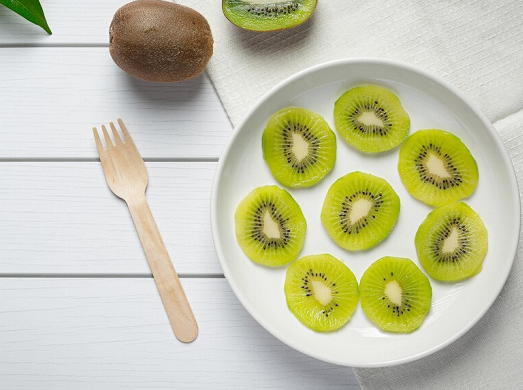Although kiwi is the size of an egg, this small, fuzzy fruit from China is an excellent source of nutrition.
Like most fruits, kiwi is rich in vitamins and minerals that the body needs. However, kiwi is special because it has several health-boosting properties that many other fruits cannot beat. And the natural compounds in kiwi can also improve gut health.
According to the BBC Good Food page, two 80-gram kiwis contain 39 calories, 0.9 grams of protein, 0.4 grams of fat, 8.5 grams of carbohydrates, 2 grams of fiber, 232 milligrams of potassium, and 47 milligrams of vitamin C.
80 grams of kiwi fruit is counted as one of the 5 portions of food you consume in a day. Here are five benefits that the body gets from consuming kiwi fruit every day, including:
1. Increase collagen
Kiwifruit is known for its high vitamin C content, where vitamin C and other antioxidant nutrients can help relieve some asthma symptoms.
It is known that one kiwi also contains more of this nutrient than two oranges. Vitamin C can boost the immune system and fight fatigue. It also helps the body absorb iron, which is needed to make red blood cells, so oxygen can flow to the body’s organs and tissues.
In addition, it also stimulates collagen production in the skin, which helps heal wounds and keeps skin looking younger.
2. Supports heart health
Eating kiwi fruit is part of a healthy diet that can support heart health. Because the content in kiwi can increase high-density lipoprotein (HDL), which is called ‘good’ cholesterol, reduce triglycerides (other blood fats), and reduce platelet aggregation, which over time can cause atherosclerosis.
Kiwi fruit also helps manage blood pressure, thanks in part to a decrease in angiotensin-converting enzymes. Being a useful source of potassium further supports the benefits of fruits that are good for the heart.
3. Source of antioxidants
Kiwis are also a good source of antioxidants, because they contain vitamin C and vitamin E. These nutrients fight cell damage caused by free radicals, which come from sunlight, air pollution, and everyday life.
Getting antioxidants in your diet can help clear some of the damage caused by free radicals and improve your health. According to registered dietitian Gillian Culbertson, RD, eating antioxidant-rich foods like kiwis can reduce your risk of diseases, including some cancers and heart disease.
“Kiwis, along with other fruits and vegetables, can help you feel better during the winter months. The antioxidants in kiwis can boost your immune system during cold and flu season and can help improve your mood,” Culbertson says, as reported by the Cleveland Clinic.
4. Facilitates digestion
Rich in fiber, kiwis support the digestive system. They also contain an enzyme called actinidin, which facilitates the breakdown of proteins, helping the body digest protein-rich foods more efficiently.
Kiwis are rich in prebiotics, which are necessary for probiotics, or friendly bacteria and yeast, to grow in the gut.
“The right balance of probiotics is important for many body processes, including fighting disease and regulating your hormones. We know that a balance of good bacteria can prevent digestive problems, certain infections, and conditions like irritable bowel syndrome. Prebiotics are important because they provide a food source for these healthy bacteria,” explains Culbertson.
5. Source of vitamin K
The benefits of vitamin K are not widely known, as it is often not listed on nutrition facts panels. However, despite its hidden status, this vitamin is an important nutrient.
“Vitamin K can help keep bones strong and reduce the risk of osteoporosis. It can also help you prevent coronary artery disease, a major cause of heart attacks and heart failure,” Culbertson says.
One kiwi contains 31 micrograms of vitamin K, about 25 percent to 30 percent of the adequate intake for most adults. Other good sources of vitamin K can also be obtained from spinach, kale, broccoli, and soybean oil.

